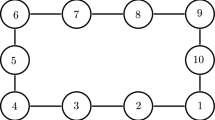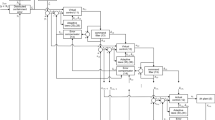Abstract
In this paper, we mainly study the optimal control problem with multi-channel control. The main contribution is to treat the optimal control problem as a leader-follower problem with multi-hierarchy decision makers in game theory. According to the sequence of the decision makers, the optimal controller is derived by the maximum principle. It is worth mentioning that the optimal solution is in the feedback form related to two symmetric Riccati equations with same dimension as the original state. Furthermore, the obtained solution is sufficient and necessary.
Similar content being viewed by others
References
D. P. Bertsekas, Dynamic Programming and Optimal Control, 2nd edition, Athena Scientific, Belmont, MA, 2000.
B. Anderson and J. Moore, Optimal Filtering, Prentice Hall, Englewood Cliffs, NJ, 1979.
F. L. Lewis, Optimal Control, John Wiley and Sons, New York, February 1986.
M. J. Osborne, An Introduction to Game Theory, Oxford University Press, 2003.
R. Isaacs, Differential Games, Dover, 1999.
T. Basar and G. Olsder, Dynamic Noncooperative Game Theory, Academic Press Inc., 1982.
C. I. Chen and J. B. Cruz Jr., “Stackelberg solution for two-person games with biased information patterns,” IEEE Trans. on Automatic Control, vol. 17, no. 6, pp. 791–798, 1972.
M. Simaan and J. B. Cruz Jr., “On the Stackelberg strategy in nonzero-sum games,” Journal of Optimization Theory and Applications, vol. 11, no. 5, pp. 533–555, 1973.
A. W. Starr and Y. C. Ho, “Nonzero-sum differential games,” Journal of Optimization Theory and Applications, vol. 3, no. 3, pp. 184–206, 1969.
L. Pan and J. Yong, “A differential game with multi-level of hierarchy,” Journal of Mathematical Analysis and Applications, vol. 161, pp. 522–544, 1991.
B. F. Gardner Jr. and J. B. Cruz Jr., “Feedback Stackelberg strategy for M-level hierarchical games,” IEEE Trans. on Automatic Control, vol. 23, no. 3, pp. 489–491, 1978.
G. Tadmor and L. Mirkin, “H ∞ control and estimation with preview-part II: fixed-size ARE solutions in discrete time,” IEEE Trans. on Automatic Control, vol. 50, no. 1, pp. 29–40, 2005.
P. Bernfiard, “Linear-quadratic, two-person, zerosum differential games: necessary and sufficient conditions,” Journal of Optimization Theory and Applications, vol. 27, no. 1, pp. 51–69, 1979.
G. Freiling, G. Jank, and S. R. Lee, “Existence and uniqueness of open-loop Stackelberg equilibria in linear-quadratic differential games,” Journal of Optimization Theory and Applications, vol. 110, no. 3, pp. 515–544, 2001.
Author information
Authors and Affiliations
Corresponding author
Additional information
Juanjuan Xu received her B.E. degree in Mathematics from the Qufu Normal University in 2006, and M.E. degree in Mathematics in 2009 from Shandong University, and her Ph.D. degree in Control Science and Engineering in 2013 from Shandong University, then postdoctoral research at the School of Control Science and Engineering, Shandong University. Her research interests include distributed consensus, optimal control, game theory, stochastic systems and time-delay systems.
Wei Wang received his Ph.D. degree in Control Science and Engineering from Shenzhen Graduate School, Harbin Institute of Technology, in 2010. He is currently a lecturer at Shandong University, Jinan Shandong, China. His research interests include optimal control and estimation for delayed systems, distributed control and estimation.
Huanshui Zhang graduated in Mathematics from the Qufu Normal University in 1986 and received his M.Sc. and Ph.D. degrees in Control Theory from Heilong jiang University, China, and Northeastern University, China, in 1991 and 1997, respectively. He worked as a postdoctoral fellow at Nanyang Technological University from 1998 to 2001 and Research Fellow at Hong Kong Polytechnic University from 2001 to 2003. He is currently a Changjiang Professorship at Shandong University, China. He held Professor in Harbin Institute of Technology from 2003 to 2006. He also held visiting appointments as Research Scientist and Fellow with Nanyang Technological University, Curtin University of Technology and Hong Kong City University from 2003 to 2006. His interests include optimal estimation and control, time-delay systems, stochastic systems, signal processing and wireless sensor networked systems.
Rights and permissions
About this article
Cite this article
Xu, J., Wang, W. & Zhang, H. Game theory approach to optimal control problem with multi-channel control. Int. J. Control Autom. Syst. 13, 58–64 (2015). https://doi.org/10.1007/s12555-013-0023-y
Received:
Revised:
Accepted:
Published:
Issue Date:
DOI: https://doi.org/10.1007/s12555-013-0023-y




